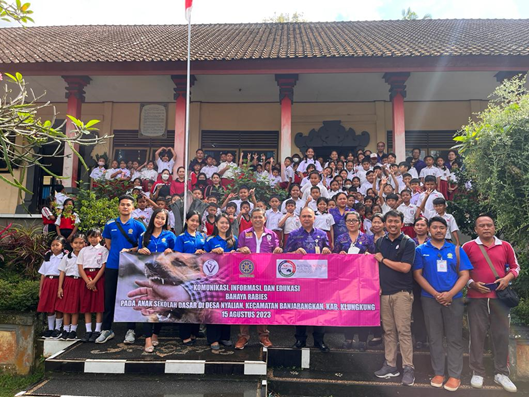FVM UNUD and IVMA Bali Held Rabies EIC Activities for Elementary School Children in Nyalian Village, Klungkung
Rabies is a widespread, neglected zoonotic disease with an almost 100% mortality rate in both animals and humans. This disease causes a significant social and economic burden in many countries around the world. Each year, between 50,000 and 70,000 people die of rabies in horrific conditions. The vast majority of global rabies cases occur in children.
In an effort to reduce the incidence of rabies in children, IVMA (Indonesian Veterinary Medical Association) Bali Branch collaborated with Udayana University's FVM (Faculty of Veterinary Medicine) and AIHSP (Australia Indonesia Health Security Partnership) held an IEC on Tuesday 15 August 2023 at Elementary School No.1 and SD No.2 in Nyalian Village, Banjarangkan District, Klungkung. In the morning the event was held at Elementary School no.1 and in the afternoon at Elementary school no.2 Nyalian Village. The EIC event which was packed with lots of games was attended by 146 people at SD 2 Nyalian and 96 people at SD No.1 . Present at the event were members of the IVMA Bali branch of the Klungkung commissariat, representatives of the Unud FVM, Village Officials, Unud KKN students, and representatives of AIHSP and the Klungkung Regency Agriculture Service.

At the event, Prof. Dr. Drh I Ketut Puja, M.Kes who is also a Lecturer at FVM Unud said that Rabies is endemic to the dog population in Bali, and almost all cases of rabies in humans are caused by bites of rabid dogs. It was further stated that controlling the disease in dogs is the most cost-effective way to prevent rabies in humans. Children are generally more susceptible to rabies infection because they lack understanding about rabies. This event is intended to increase the understanding of elementary school students about the dangers of rabies and how it is transmitted as well as increase the knowledge and skills of elementary school students in carrying out the initial handling of bite wounds by rabies-transmitting animals.
Given the highly effective rabies vaccines and diagnostics currently available, successful dog and human rabies eradication can be achieved with the right commitment, resources, planning and coordination. Unfortunately, for 15 years, rabies still exists in Bali. According to Puja, the status of this neglected disease contributes to the perception of policy makers that rabies is not significant. This perception ultimately leads to little motivation to support and implement disease control measures.

Meanwhile, AIHSP represented by Drh Made Angga Prayuda, M.Si said that the most important thing that children should know is the dangers of rabies, avoiding dog bites and reporting to parents and teachers if bitten by a dog or cat. In another part, Drh Made Angga said that the success of eradicating rabies in Bali will depend on interdisciplinary effectiveness and cross-sectoral collaboration.
In this activity, IVMA Bali collaborated with various stakeholders. The most enduring and powerful approach to changing behavior involves integrating rabies programs into schools for children. This is because long-term behavior change in society is often most effectively delivered through the young. In addition, many human deaths due to rabies occur in children less than 15 years of age. Therefore, in selecting this target, consider involving schools or at least school-age children.










